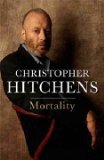Five words from the blurb: cancer, pain, moving, personal, death
I hadn’t heard of Christopher Hitchens until my book group suggested this as our next read. Having researched his life I’m sad that I wasn’t aware of him before, but I hope to read more of his books in the future.
Christopher Hitchens was a controversial journalist who wrote numerous columns and books, many of which criticised religion. In 2010 he was diagnosed with terminal cancer and needed Home Care Assistance. Mortality is a collection of essays that he wrote during his final year alive; a time during which he suffered from much pain and pondered on society’s attitude to illness and death.
Mortality was eye-opening for me. I don’t think I’ve read anything in which a person is so unafraid to air controversial opinions. I didn’t agree with everything he said, but I admired his honesty. The writing was so clear and thought provoking that much of it made me look at suffering in a slightly different light.
Many parts of the book satirised people who prayed for him or those who looked to religion as a way of comforting him as he neared death.
I don’t mean to br churlish about any kind intentions, but when September 20 comes, please don’t trouble deaf heaven with your bootless cries. Unless, of course, it makes you feel better.
He also described his pain and the terrible ways in which his body began to fail him. His honest, unflinching descriptions of his deterioration were heartbreaking.
It’s probably a merciful thing that pain is impossible to describe from memory. It’s also impossible to warn against. If my proton doctors had tried to tell me up front, they might perhaps have spoken of “grave discomfort” or perhaps a burning sensation. I only know that nothing at all could have readied or steadied me for this thing that seemed to scorn painkillers and to attack me in the my core. I now seem to have run out of radiation options in those spots (thirty-five straight days being considered as much as anyone can take), and while this isn’t in any way good news, it spares me from having to wonder if I could willingly endure the same course of treatment again.
The end of the book contained fragmented jottings, discovered after his death. These provided an insight into his writing process and were a sad reminder of what might have been if he’d lived longer.
Christopher Hitchens wont be to everyone’s taste, but his discussions were eye-opening and a refreshing change from the sentimental, rose-tinted descriptions of death that we’re used to.
Recommended to those with an open mind who’d like a realistic description of what happens to a person as they die.

.
Have you read any of Christopher Hitchens’ books?
What did you think of them?

